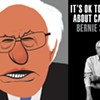Published December 29, 2009 at 10:19 p.m.
A group of Burlington residents have garnered the necessary 1654 signatures to put a simple question to voters: Should Burlington revert to its old way of electing its mayor?
Instant runoff voting (IRV) — which allows voters to rank candidates as a way to choose a winner on election day rather than holding costly separate runoff elections – was perhaps the most controversial element in a five-way race for mayor in March.
If there is no majority winner (50-plus percent) after all first-place ballots are counted, candidates who statistically can't win are eliminated, and their second-place votes are distributed among the remaining candidates. This process is repeated until someone with 50 percent of the vote emerges.
If IRV is repealed, then the next election for mayor will revert to the old system: A simple plurality (40 percent) wins the day. If no one has 40 percent on election night, then a special runoff between the top two candidates will be held 30 days later.
A multipartisan group calling itself "One Person, One Vote" held a press conference Tuesday afternoon in a City Hall conference room to declare that IRV was a convoluted system that frustrated voters and may have depressed voter turnout.
"I was an early supporter of IRV," said Democrat John Ewing. "But I've been disappointed in the way it has worked. I think it has proven itself to be a disservice to the voters. I think it's extremely convoluted and that voters don't understand how it works."
If that's true, it would be a slight turnaround from a poll conducted in 2006 — the first year IRV was used in Burlington to elect a mayor.
In 2006, a University of Vermont professor and his students polled Burlingtonians about their understanding of IRV and found that 63.4 percent of voters said they liked IRV, while 17.9 percent disliked it and 18.7 percent did not have an opinion or didn’t know whether they liked it. Those with a postgraduate degree liked IRV more than those with a high school diploma or less. Only about 8 percent of those polled found the system confusing.
Several of the IRV opponents, including Ewing, backed Republican Kurt Wright for mayor this past March. Another Wright supporter, David Hartnett, also collected signatures for the group and said this was more than a sour grapes campaign.
"This has been a grassroots effort," noted Hartnett. "We waited to bring in the signatures because we didn't want this to be about Kurt Wright losing after being ahead, or Andy Montroll who had more first and second place votes and didn't win. We wanted this to be about IRV. In fact, I don't think a lot of people understood what they were voting for in 2005 when they approved it."
Hartnett and other IRV opponents said after two mayoral elections it was time for voters to weigh in — again — on whether the voting system was working.
"There was a lot on the ballot that year, and IRV got kinda lost in the shuffle," said Hartnett. "In the next two and a half months there will be time to focus on IRV."
Hartnett and others said that, while the lion's share of early grassroots energy this year emanated from the New North End, petitioners come from throughout the city and represent all major political parties in the Queen City.
Also joining Hartnett and Ewing at Tuesday's event was Sam Osborne, a prominent Burlington Democrat, Chuck Saleen, a New North End Democrat, and Linda Chagnon of the New North End. Chagnon alone netted roughly 500 signatures.
Ewing and other IRV opponents said the system has done nothing to increase voter turnout. In fact, only 27 percent of registered voters turned up at the polls in March 2009, which seems pretty dismal.
That can be compared with a voter turnout of slightly more than 30 percent in 2006. That said, 2009 had a better turnout than 2003 (22.3 percent) and 2001 (18.7 percent).
In March 2009, there were five candidates on the ballot, four of whom ran strong campaigns: Progressive Bob Kiss (incumbent), then-Councilor Andy Montroll (Democrat), James Simpson (Green Party), Independent Dan Smith and then-Councilor Wright.
Here's how the vote broke down on election night: In the first round, Wright had 2951 (33%) votes to Kiss' 2585 (29%) and Montroll's 2063 (23%).
In the second round, Wright had 3294 (37%) to Kiss' 2981 (34%) and Montroll's 2554 (29%) after Smith's and Simpson's votes were eliminated and their voters' second preferences divvied up among the other three candidates.
In the final round, Montroll was eliminated and 1332 of his preferences went to Kiss, while 767 went to Wright. That put Kiss on top with 4313 (51.5%) and Wright with 4061 (48%).
Hence the inspiration behind this T-shirt, which offered a new definition of IRV: “Keep Counting ’Til Bob Wins.”
In 2006, it also took Kiss more than one round to win a majority of votes, but he was in the lead in both rounds against his closest challenger — Democrat Hinda Miller.
This year, however, the margin was close enough that Wright asked for a recount. Wright called off the hand recount as soon as it was clear that it was not differing from the election night results.
Here was my take in a "Fair Game" column shortly after the election, after some fumed that Wright had the election stolen from him. I mean, really, who would have thought a left-leaning, liberal city would pass on putting a Republican in the mayor's office? Incroyable!
IRV proponents noted at the time, and will undoubtedly note again in the coming months, that IRV worked as it was designed.
They said the ranking system saves time and money by allowing voters to rank their candidates and take care of the runoff the same night. Also, fewer voters actually take part in separate runoff elections.
But that doesn't stop folks from claiming hell froze over last March. Vermont GOP Chairman Rob Roper called Kiss' reelection a "travesty" and claimed the "will of the voters was circumvented."
Was it true? I decided to look more closely at how the votes broke down, and here's what I found:
People may not be happy that Kiss was reelected, and certainly at today's press conference the word "leadership" was tossed around a lot — mostly in a negative sense. As in, Kiss offers none.
Look, it's no secret that Wards 4 and 7 are more conservative than other parts of the city and that they were going to go overwhelmingly for Wright. And they did.
The question for March 2010, however, is how much of the anti-IRV effort is truly a referendum on IRV, and how much is a referendum on Mayor Kiss. His term isn't up, technically, until 2012, but a spate of leadership crises related to Burlington Telecom, the Moran Plant redevelopment and the loss of General Dynamics practically put Kiss in the lame duck category. And to think it's only the guy's first year of a three-year term.
Sounds like IRV could soon find itself another fossilized relic that anthropologists hundreds of years from now use to define what could be dubbed Burlington's Progressazoic Era.
One or more images has been removed from this article. For further information, contact
[email protected].
More By This Author
Speaking of Blurt
-
Blurt Is No More. Here's Where to Find New Seven Days Content
Sep 17, 2012 -
Alice Eats: The Mill Market & Deli
Sep 11, 2012 -
Grazing at King Arthur Flour's Airy New Digs
Sep 10, 2012 -
Movies You Missed 55: Making Plans for Léna
Sep 7, 2012 -
Quiz: Ben & Jerry's Flavor or Porn Flick?
Sep 6, 2012 - More »
Comments (138)
Showing 1-10 of 138
Comments are closed.
From 2014-2020, Seven Days allowed readers to comment on all stories posted on our website. While we've appreciated the suggestions and insights, right now Seven Days is prioritizing our core mission — producing high-quality, responsible local journalism — over moderating online debates between readers.
To criticize, correct or praise our reporting, please send us a letter to the editor or send us a tip. We’ll check it out and report the results.
Online comments may return when we have better tech tools for managing them. Thanks for reading.















































